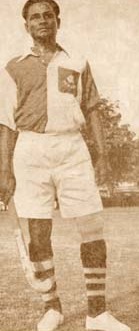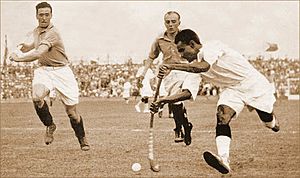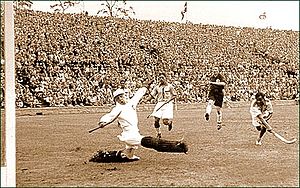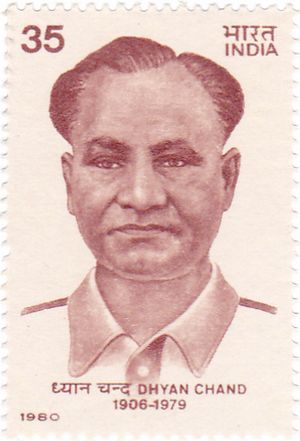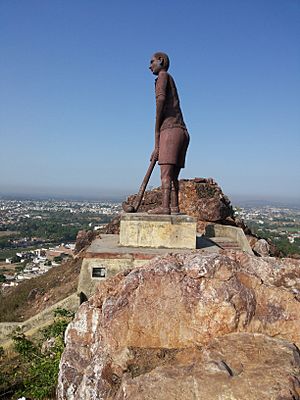Dhyan Chand facts for kids
Quick facts for kids
Dhyan Chand
|
||||||||||||||||||||||||||||||||||||||||||||||||||||||
|---|---|---|---|---|---|---|---|---|---|---|---|---|---|---|---|---|---|---|---|---|---|---|---|---|---|---|---|---|---|---|---|---|---|---|---|---|---|---|---|---|---|---|---|---|---|---|---|---|---|---|---|---|---|---|
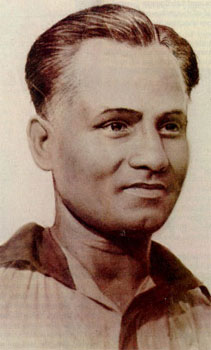 |
||||||||||||||||||||||||||||||||||||||||||||||||||||||
| Birth name | Dhyan Singh | |||||||||||||||||||||||||||||||||||||||||||||||||||||
| Nickname(s) | The Wizard, The Magician | |||||||||||||||||||||||||||||||||||||||||||||||||||||
| Born | 29 August 1905 Allahabad, United Provinces of Agra and Oudh, British India (present-day Prayagraj, Uttar Pradesh, India) |
|||||||||||||||||||||||||||||||||||||||||||||||||||||
| Died | 3 December 1979 (aged 74) All India Institute of Medical Sciences, New Delhi, India |
|||||||||||||||||||||||||||||||||||||||||||||||||||||
| Allegiance | ||||||||||||||||||||||||||||||||||||||||||||||||||||||
| Service/ |
||||||||||||||||||||||||||||||||||||||||||||||||||||||
| Years of service | 1922–1956 | |||||||||||||||||||||||||||||||||||||||||||||||||||||
| Rank | ||||||||||||||||||||||||||||||||||||||||||||||||||||||
| Unit | 1st Brahmans 14th Punjab Regiment Punjab Regiment |
|||||||||||||||||||||||||||||||||||||||||||||||||||||
| Awards | ||||||||||||||||||||||||||||||||||||||||||||||||||||||
|
||||||||||||||||||||||||||||||||||||||||||||||||||||||
Major Dhyan Chand (born Dhyan Singh, 29 August 1905 – 3 December 1979) was an amazing Indian field hockey player. Many people think he was one of the best field hockey players ever. He was famous for his incredible control of the ball and scoring many goals.
He won three Olympic gold medals for India in 1928, 1932, and 1936. During this time, India was super strong in field hockey. India won the Olympic hockey event in seven out of eight Olympics from 1928 to 1964, showing Dhyan Chand's huge impact.
People called him The Wizard or The Magician of hockey because of his amazing ball skills. He played for India from 1926 to 1949. In his autobiography, Goal, he said he scored 570 goals in 185 matches. He scored over 1000 goals in his whole career, including domestic and international games. The BBC even called him "hockey's equivalent of Muhammad Ali".
In 1956, the Government of India gave Dhyan Chand the Padma Bhushan. This is India's third highest award for civilians. His birthday, 29 August, is celebrated every year in India as National Sports Day. India's top sports award, the Major Dhyan Chand Khel Ratna Award, is named after him.
Contents
Early Life and First Steps in Hockey
Dhyan Chand was born in Allahabad on 29 August 1905. He came from a Rajput family. He had two brothers, Mool Singh and Roop Singh. Roop Singh also became a famous hockey player. Their father, Sharadha Singh, was in the British Indian Army and played hockey for the army.
Because his father moved often for army work, Dhyan Chand's family lived in many different cities. He had to stop school after only six years. The family eventually settled in Jhansi, Uttar Pradesh, India.
Young Dhyan Chand wasn't very interested in sports at first. He actually loved wrestling! He later said he didn't remember playing much hockey before joining the Army. He only played casual games with friends in Jhansi sometimes.
Starting His Hockey Journey
On his 17th birthday, 29 August 1922, Dhyan Chand joined the 1st Brahmans of the British Indian Army. He started as a sepoy (a private soldier). His unit later became the 1/1st Punjab Regiment. From 1922 to 1926, he played only in army hockey tournaments.
In 1926, Dhyan Chand was chosen for the Indian Army team that would tour New Zealand. The team did incredibly well, winning 18 matches, drawing 2, and losing only 1. Everyone who watched them was very impressed. In two special matches against the New Zealand team, India won one and just barely lost the other. When he returned to India, Dhyan Chand was promoted to Lance Naik in 1927.
Preparing for the Olympics
After a lot of effort, field hockey was brought back into the Olympics. The new Indian Hockey Federation (IHF) started getting ready to send a strong team to the 1928 Amsterdam Olympics. In 1925, they held a special tournament to pick the best players. Dhyan Chand got permission from the Army to play for the United Provinces team.
In his first game, Dhyan Chand, playing as a centre-forward, showed off his amazing stick-work. He made clever runs and passes. He scored a goal within just three minutes! His team, United Provinces, won the match 3–1.
After this success, the IHF decided to hold the tournament every two years. Dhyan Chand was chosen for the Olympic team as a centre-forward. Broome Eric Pinniger became the captain. The team faced some money problems at first, but they managed to gather enough funds.
The Olympic team played a practice match against a Bombay team and surprisingly lost 3–2, even though Dhyan Chand scored both goals. On 10 March, the team left for England. They played 11 matches there, winning all of them. Some say Great Britain didn't send a team to the 1928 Olympics because India had beaten them.
On 24 April, the team arrived in Amsterdam. They played many practice matches against teams from the Netherlands, Germany, and Belgium, winning by big scores.
1928 Amsterdam Olympics: India's First Gold
At the 1928 Amsterdam Summer Olympics, India was in a group with Austria, Belgium, Denmark, and Switzerland.
- On 17 May, India played its first Olympic match against Austria, winning 6–0. Dhyan Chand scored 3 goals.
- The next day, India beat Belgium 9–0, with Dhyan Chand scoring once.
- On 20 May, Denmark lost to India 5–0, and Dhyan Chand scored 3 goals.
- Two days later, he scored 4 goals as India defeated Switzerland 6–0.
The final match was on 26 May, against the Netherlands. Some of India's best players were sick, and Dhyan Chand himself wasn't feeling well. But even with a weaker team, India won 3–0, with Dhyan Chand scoring 2 goals. India won its very first Olympic gold medal! Dhyan Chand was the top scorer of the tournament, with 14 goals in 5 matches.
After the final, people in the Netherlands were so amazed by Dhyan Chand's ball control that they broke his hockey stick to check if there was a magnet inside! An old woman even asked him to play with her walking cane, and he still scored goals with it. When the team returned to India, thousands of people welcomed them at the Bombay harbour.
1932 Los Angeles Olympics: The Hockey Twins
Dhyan Chand was now a naik (corporal) and stationed in Waziristan. He was chosen for the 1932 Olympic team without having to go through trials. His brother, Roop Singh, was also picked. Lal Shah Bokhari became the captain.
The team played practice matches in India and then in Ceylon, winning 20–0 and 10–0. One newspaper wrote that even the weather seemed to pay tribute to the Indian players' genius.
The team sailed to San Francisco and then reached Los Angeles three weeks before the 1932 Summer Olympics.
- On 4 August 1932, India played its first match against Japan and won 11–1. Dhyan Chand, Roop Singh, and Gurmit Singh each scored three goals.
- In the final on 11 August, India played against the USA. India won an amazing 24–1! This was a world record at the time. India won the gold medal again. Dhyan Chand scored 8 goals, and Roop Singh scored 10. Together, they scored 25 out of India's 35 goals in the tournament. This earned them the nickname 'hockey twins'.
A Los Angeles newspaper described the Indian team as "a typhoon out of the east." After the Olympics, the team toured the United States and England, playing many matches. By the end of the tour, India had played 37 matches, winning 34. Dhyan Chand scored 133 of India's 338 goals. In India, he is often called Hockey ka Jaadugar, meaning "Magician of the game of Hockey".
Captaincy and 1936 Berlin Summer Olympics
In 1933, Dhyan Chand's local team, the Jhansi Heroes, won the Beighton Cup. He thought this was the most important hockey tournament in India. They also won another tournament in Kolkata.
In December 1934, the IHF decided to send a team to New Zealand. Dhyan Chand and his brother were chosen. When the original captain couldn't play, Dhyan Chand was made captain. On this tour, the team played 48 matches in New Zealand, India, Ceylon, and Australia. India won every single match, scoring 584 goals and only letting in 40! Dhyan Chand played in 23 of these matches and scored 201 goals.
In December 1935, Dhyan Chand was again selected for the Olympic team without trials. The team gathered in Delhi and then left for Marseilles on 27 June. They arrived in Berlin on 13 July. A practice match against Germany on 17 July was lost 4–1, which worried the team manager.
At the 1936 Berlin Summer Olympics:
- On 5 August, India won its first match against Hungary 4–0.
- India won its other group matches against the USA (7–0, Dhyan Chand scored 2) and Japan (9–0, Dhyan Chand scored 4).
- On 10 August, another player, Ali Dara, joined the team.
- The semi-final was against France, and India won 10–0, with Dhyan Chand scoring 4 goals.
The final match was on 19 August against Germany. The Indian team was nervous because they had lost to Germany in a practice match. Before the game, the manager showed them an Indian tricolour flag. The team saluted it, prayed, and went onto the field.
Germany managed to keep India to only one goal in the first half. But after the break, the Indian team attacked with full force. They easily defeated Germany 8–1! This was the only goal scored against India in the entire tournament. Dhyan Chand wrote in his autobiography, Goal!, that he scored three goals in the final. Other players like Ali Dara, Roop Singh, Carlyle Tapsell, and Sayed Jaffar also scored.
The International Hockey Federation records also show Dhyan Chand scored three goals in the final. The final match was even shown in the film Olympia about the 1936 Olympics. In total, Dhyan Chand scored 33 goals in 12 matches across his three Olympic tournaments.
It is said that the German leader Adolf Hitler was very impressed by Dhyan Chand's skills. He supposedly offered Dhyan Chand German citizenship and a high rank in the German Army. Dhyan Chand politely said no to the offer.
Later Career and Retirement
After returning from Berlin, Dhyan Chand continued his army duties. Between 1936 and 1939, he mostly played army hockey. In 1938, he was promoted to jemadar (a junior officer rank). During World War II, he was promoted further, becoming a lieutenant in 1943.
Towards the end of the war, Dhyan Chand led an army hockey team that played matches in places like Manipur, Burma, and Ceylon. After the war ended in 1945, Dhyan Chand felt that the Indian hockey team needed new, young players.
In 1947, he was asked to captain a team for a tour of East Africa. Even though he was in his forties, Dhyan Chand still scored 61 goals in 22 matches on this tour.
After returning in early 1948, Dhyan Chand decided to slowly stop playing serious hockey. He played exhibition matches, leading a 'Rest of India' team against state teams. His last match was leading the 'Rest of India' team against the Bengal side, which ended in a draw. The Bengal Hockey Association held a special event to honor him.
Final Years
Dhyan Chand continued to serve in the Indian Army after India became independent. In 1951, he was honored at India's National Stadium with the first-ever Dhyan Chand Tournament.
After 34 years of service, Dhyan Chand retired from the Indian Army on 29 August 1956 as a lieutenant (acting captain). The Government of India honored him that same year with the Padma Bhushan, India's third highest civilian award.
After retiring, he taught at hockey coaching camps. Later, he became the Chief Hockey Coach at the National Institute of Sports, Patiala, for several years. Dhyan Chand spent his last days in his hometown of Jhansi, Uttar Pradesh, India.
Dhyan Chand passed away on 3 December 1979 from liver cancer in Delhi. He was cremated at the Jhansi Heroes ground in his hometown. His regiment, the Punjab Regiment, gave him full military honors.
Legacy and Honors
Dhyan Chand is still a legendary figure in Indian and world hockey. Many stories are told about his amazing ball control. His birthday, 29 August, is celebrated as National Sports Day in India. On this day, the President gives out important sports awards like the Major Dhyanchand Khel Ratna, Arjuna Award, and Dronacharya Award.
In 2012, Dhyan Chand was given the "Gem of India" award. His son, Ashok Dhyan Chand, who was also an Olympic hockey player, accepted the award for his father.
India's highest award for lifetime achievement in sports is the Dhyan Chand Award, started in 2002. It honors sports figures who contribute to their sport even after they retire. The National Stadium, Delhi was renamed Dhyan Chand National Stadium in 2002 to honor him.
A hostel at Aligarh Muslim University, where he studied, is named after him. He scored over 1000 goals in his career from 1926 to 1948, making him the highest goal scorer in hockey history.
An Astroturf hockey pitch at the Indian Gymkhana Club in London is also named after him. The Government of India has also released a special postage stamp and a First Day Cover in his honor. He is the only Indian hockey player to have a stamp dedicated to him.
Dhyan Chand was considered for India's highest civilian award, the Bharat Ratna, in 2014. However, the award was given to Sachin Tendulkar and C. N. R. Rao that year.
Honors
- Major Dhyan Chand Khel Ratna Award: This is India's highest sports award, named after him. The Sports Ministry gives it every year to India's best performers in international championships.
- Dhyan Chand Award: This is a lifetime achievement award named after Dhyan Chand.
See also
 In Spanish: Dhyan Chand para niños
In Spanish: Dhyan Chand para niños
- Field hockey in India
- List of Indian hockey captains in Olympics
- Ashok Kumar Singh
- Roop Singh


